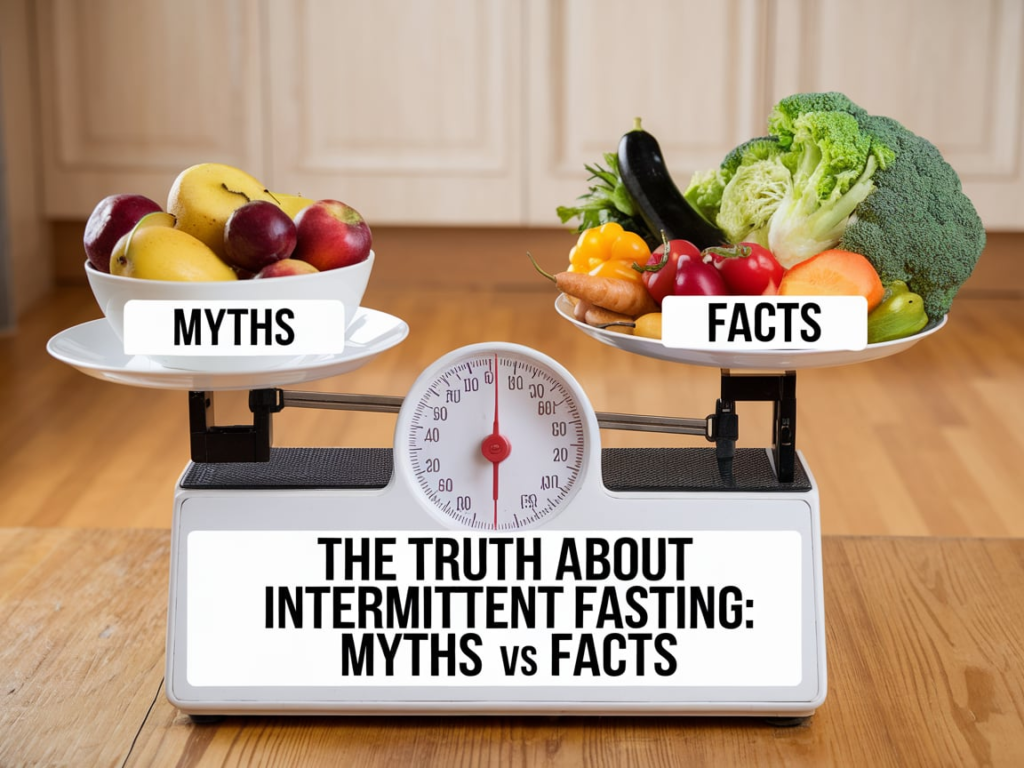Meta Description: Learn the truth behind intermittent fasting. We break down the most common myths vs facts about fasting to help you understand its benefits and how it can support your health and weight loss goals.
The Truth About Intermittent Fasting: Myths vs Facts

Intermittent fasting (IF) has become a popular approach to weight loss, improved health, and even longevity. However, many myths and misconceptions have emerged as this eating pattern has gained traction. Is it really a game-changer for your health, or just another passing trend? In this article, we’ll explore the most common myths and facts surrounding intermittent fasting to help you make an informed decision about whether it’s right for you.
What is Intermittent Fasting?
Before diving into the myths and facts, let’s define intermittent fasting. It’s an eating schedule that alternates between periods of fasting and eating. Unlike traditional diets that focus on what you eat, intermittent fasting is all about when you eat.
Popular fasting schedules include:
- The 16/8 method: Fast for 16 hours and eat within an 8-hour window.
- The 5:2 method: Eat normally for five days and restrict calories (500-600) for two days.
- Eat-Stop-Eat: Fast for 24 hours once or twice a week.
Now, let’s explore some myths vs facts about intermittent fasting.
Myth #1: Fasting Makes You Starve Yourself
One of the most common misconceptions about intermittent fasting is that it forces you to starve, leading to feelings of exhaustion and irritability.
Fact: While fasting can be challenging at first, it doesn’t mean you’ll feel hungry all the time. Many people find that after a few days, their hunger naturally stabilizes. The body learns to burn fat for energy during the fasting periods, and many individuals report feeling more energized and focused as a result.
Additionally, staying hydrated with water, herbal teas, or black coffee during fasting can help reduce hunger pangs.
Myth #2: Fasting Slows Down Your Metabolism
Another popular belief is that fasting slows down metabolism, making it harder for your body to burn fat.
Fact: In reality, fasting can boost your metabolism. When fasting, your body increases the production of norepinephrine, a fat-burning hormone. Additionally, insulin levels drop, which helps your body burn fat more efficiently.
Studies suggest that short-term fasting can increase metabolic rate by up to 14%, helping you burn more calories. However, for long-term success, it’s important to balance fasting with proper nutrition and exercise.
Myth #3: You Can Eat Whatever You Want During the Eating Window
Many people assume that fasting means you can eat anything during your designated eating window, since you’re restricting food intake during fasting periods.
Fact: Although intermittent fasting doesn’t prescribe specific foods, it’s important to make healthy choices during your eating window. If you consume processed foods, sugary snacks, or unhealthy meals, you may not experience the full benefits of fasting.
To get the most out of this eating schedule, focus on nutrient-dense foods, such as vegetables, lean proteins, whole grains, and healthy fats. Eating balanced meals will ensure you stay energized and get the most from your fasting regimen.
Myth #4: Fasting is Only for Weight Loss
One of the biggest misconceptions is that fasting is solely for those who want to lose weight.
Fact: While fasting can be an effective weight-loss tool, its benefits go far beyond just shedding pounds. Research shows that fasting can help reduce the risk of chronic diseases like heart disease, type 2 diabetes, and certain cancers. It also triggers autophagy, a process in which the body repairs and regenerates cells.
Additionally, fasting has been linked to improved brain function, memory, and protection against age-related diseases, making it beneficial for overall health—not just weight management.
Myth #5: Intermittent Fasting is Not Suitable for Older Adults
Many believe that older individuals should avoid intermittent fasting because their metabolism slows down with age and fasting could be too harsh on their bodies.
Fact: Fasting can benefit older adults by helping to reduce inflammation, improve metabolism, and promote healthy aging. Studies suggest that fasting may improve cardiovascular health, regulate blood sugar levels, and reduce the risk of diseases associated with aging.
However, it’s important for older individuals to consult with a healthcare provider before starting a fasting regimen, particularly if they have pre-existing health conditions like diabetes or heart disease.
Myth #6: Fasting Causes Muscle Loss
A common concern is that fasting will cause your body to break down muscle tissue for energy during fasting periods.
Fact: When done properly, intermittent fasting should not cause muscle loss. In fact, fasting can help preserve muscle mass while promoting fat loss. Combining fasting with strength training and adequate protein intake will help protect your muscles.
Fasting actually encourages the production of growth hormone, which supports muscle maintenance and fat burning. As long as you’re consuming enough protein and exercising regularly, you can maintain muscle while losing fat.
Myth #7: Fasting is Too Difficult to Stick With Long-Term
Many people believe that intermittent fasting is too restrictive to maintain over the long run.
Fact: While fasting can be difficult at first, most people find that it becomes easier over time. Your body gradually adapts to fasting windows, and you may even begin to enjoy the structure it provides.
Fasting allows your body to take a break from digestion, and many individuals report feeling more focused and energized during fasting periods. Since intermittent fasting doesn’t require calorie counting or restrictive food rules, it’s easier for some to stick with it long-term.
Final Thoughts: Is Intermittent Fasting Right for You?
Intermittent fasting can be a powerful tool for improving your health, supporting weight loss, and boosting energy levels. However, it’s important to separate the myths from the facts to make an informed decision about whether it’s the right approach for you.
If you’re new to intermittent fasting, start slowly and listen to your body. It’s not about pushing yourself too hard but finding a routine that works with your lifestyle. If you have any underlying health conditions, it’s a good idea to consult with a healthcare provider before starting.
When done correctly, intermittent fasting can be an effective, sustainable way to support both your physical and mental health.
Useful Resources:
- Intermittent Fasting for Beginners
- The Science Behind Intermittent Fasting
- Benefits of Intermittent Fasting
Frequently Asked Questions (FAQs)
1. Is intermittent fasting safe for everyone?
Intermittent fasting is safe for most healthy individuals, but it may not be suitable for pregnant women, people with eating disorders, or individuals with certain medical conditions. Always consult your doctor before starting a fasting regimen.
2. How long does it take to see results with intermittent fasting?
Many people notice results within a few weeks, including weight loss, better energy, and improved focus.
3. Can I drink coffee or tea during fasting?
Yes, drinking black coffee or tea is allowed during fasting periods, but avoid adding sugar or cream as it may break your fast.
4. Can I combine intermittent fasting with other diets?
Yes, you can combine intermittent fasting with other diets, such as keto, paleo, or vegan. Just be sure to focus on nutritious, whole foods during your eating windows.
5. Will I feel hungry all the time during fasting?
It’s common to feel hunger at first, but many people report that their hunger subsides after the first few days or weeks. Drinking water and staying hydrated can also help curb hunger.






